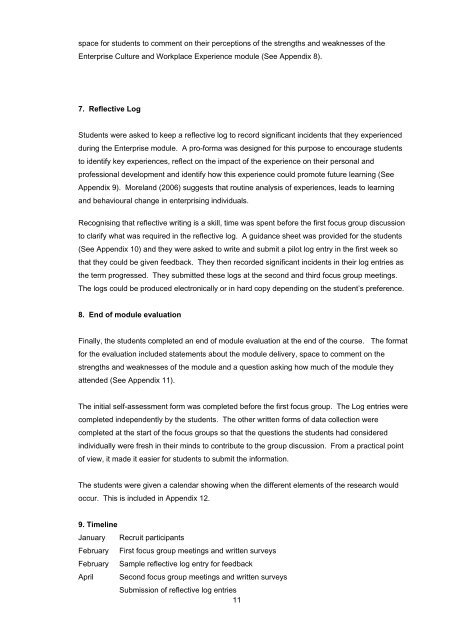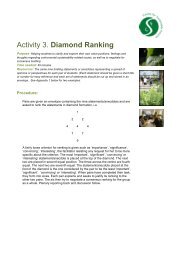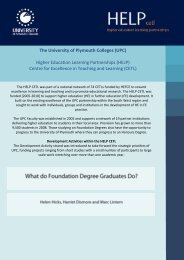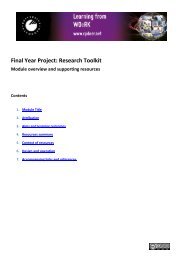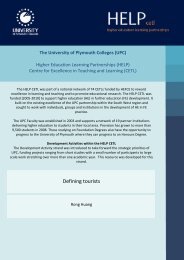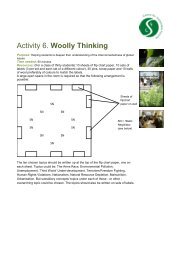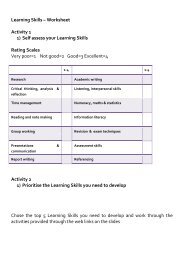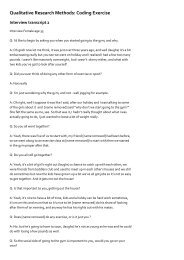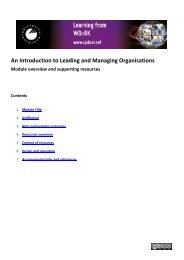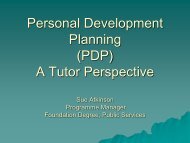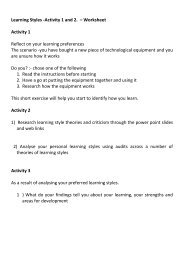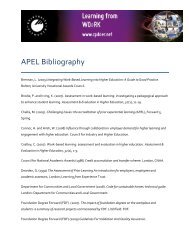The Learning Ex ... ts at Somerset College.pdf
The Learning Ex ... ts at Somerset College.pdf
The Learning Ex ... ts at Somerset College.pdf
Create successful ePaper yourself
Turn your PDF publications into a flip-book with our unique Google optimized e-Paper software.
space for studen<strong>ts</strong> to comment on their perceptions of the strengths and weaknesses of the<br />
Enterprise Culture and Workplace <strong>Ex</strong>perience module (See Appendix 8).<br />
7. Reflective Log<br />
Studen<strong>ts</strong> were asked to keep a reflective log to record significant inciden<strong>ts</strong> th<strong>at</strong> they experienced<br />
during the Enterprise module. A pro-forma was designed for this purpose to encourage studen<strong>ts</strong><br />
to identify key experiences, reflect on the impact of the experience on their personal and<br />
professional development and identify how this experience could promote future learning (See<br />
Appendix 9). Moreland (2006) sugges<strong>ts</strong> th<strong>at</strong> routine analysis of experiences, leads to learning<br />
and behavioural change in enterprising individuals.<br />
Recognising th<strong>at</strong> reflective writing is a skill, time was spent before the first focus group discussion<br />
to clarify wh<strong>at</strong> was required in the reflective log. A guidance sheet was provided for the studen<strong>ts</strong><br />
(See Appendix 10) and they were asked to write and submit a pilot log entry in the first week so<br />
th<strong>at</strong> they could be given feedback. <strong>The</strong>y then recorded significant inciden<strong>ts</strong> in their log entries as<br />
the term progressed. <strong>The</strong>y submitted these logs <strong>at</strong> the second and third focus group meetings.<br />
<strong>The</strong> logs could be produced electronically or in hard copy depending on the student’s preference.<br />
8. End of module evalu<strong>at</strong>ion<br />
Finally, the studen<strong>ts</strong> completed an end of module evalu<strong>at</strong>ion <strong>at</strong> the end of the course. <strong>The</strong> form<strong>at</strong><br />
for the evalu<strong>at</strong>ion included st<strong>at</strong>emen<strong>ts</strong> about the module delivery, space to comment on the<br />
strengths and weaknesses of the module and a question asking how much of the module they<br />
<strong>at</strong>tended (See Appendix 11).<br />
<strong>The</strong> initial self-assessment form was completed before the first focus group. <strong>The</strong> Log entries were<br />
completed independently by the studen<strong>ts</strong>. <strong>The</strong> other written forms of d<strong>at</strong>a collection were<br />
completed <strong>at</strong> the start of the focus groups so th<strong>at</strong> the questions the studen<strong>ts</strong> had considered<br />
individually were fresh in their minds to contribute to the group discussion. From a practical point<br />
of view, it made it easier for studen<strong>ts</strong> to submit the inform<strong>at</strong>ion.<br />
<strong>The</strong> studen<strong>ts</strong> were given a calendar showing when the different elemen<strong>ts</strong> of the research would<br />
occur. This is included in Appendix 12.<br />
9. Timeline<br />
January Recruit participan<strong>ts</strong><br />
February First focus group meetings and written surveys<br />
February Sample reflective log entry for feedback<br />
April Second focus group meetings and written surveys<br />
Submission of reflective log entries<br />
11


